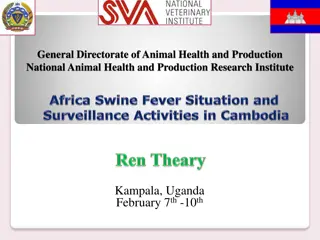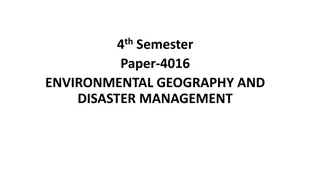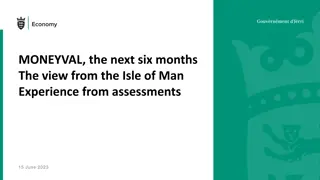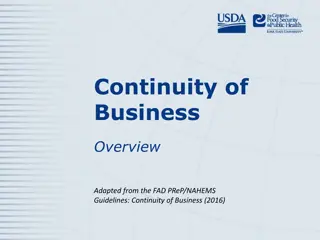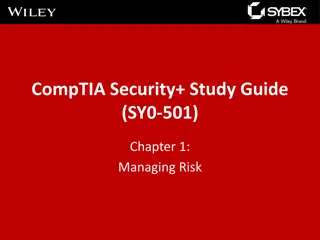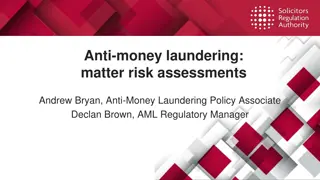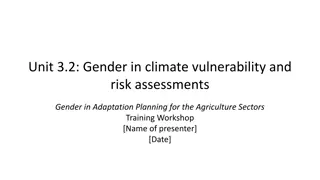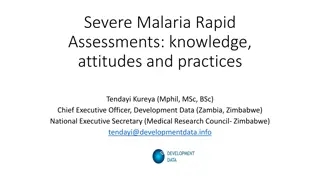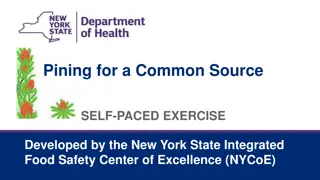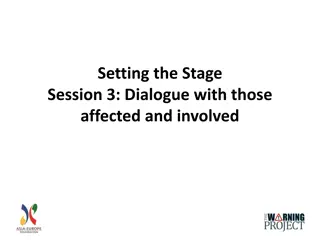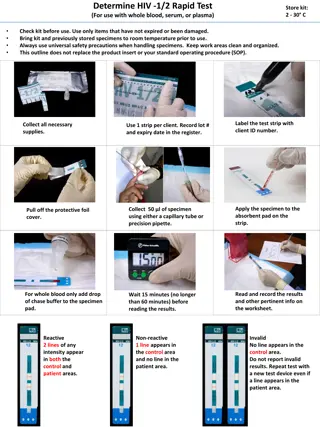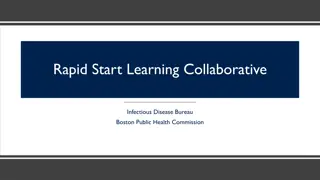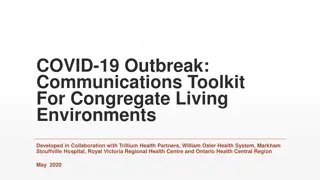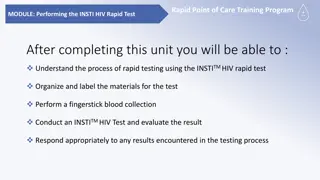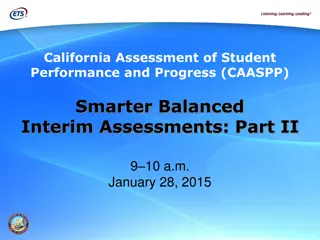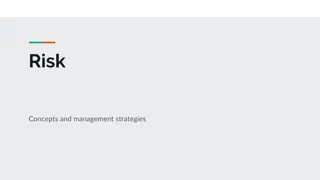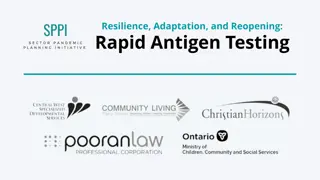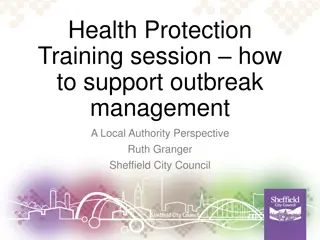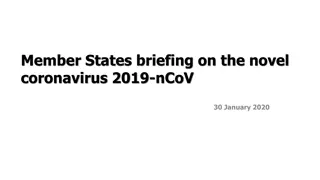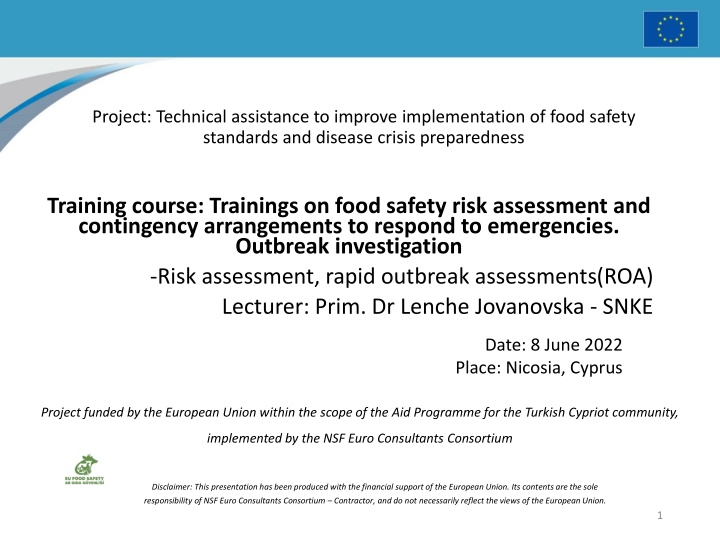
Enhancing Food Safety Standards and Disease Crisis Preparedness
Explore the implementation of food safety standards, disease crisis preparedness, risk assessment, and outbreak investigation in the context of the European Union-funded project. Learn about key stakeholders, risk assessment platforms, and risk management strategies to respond to emergencies effectively.
Download Presentation

Please find below an Image/Link to download the presentation.
The content on the website is provided AS IS for your information and personal use only. It may not be sold, licensed, or shared on other websites without obtaining consent from the author. If you encounter any issues during the download, it is possible that the publisher has removed the file from their server.
You are allowed to download the files provided on this website for personal or commercial use, subject to the condition that they are used lawfully. All files are the property of their respective owners.
The content on the website is provided AS IS for your information and personal use only. It may not be sold, licensed, or shared on other websites without obtaining consent from the author.
E N D
Presentation Transcript
Project: Technical assistance to improve implementation of food safety standards and disease crisis preparedness Training course: Trainings on food safety risk assessment and contingency arrangements to respond to emergencies. Outbreak investigation -Risk assessment, rapid outbreak assessments(ROA) Lecturer: Prim. Dr Lenche Jovanovska - SNKE Date: 8 June 2022 Place: Nicosia, Cyprus Project funded by the European Union within the scope of the Aid Programme for the Turkish Cypriot community, implemented by the NSF Euro Consultants Consortium Disclaimer: This presentation has been produced with the financial support of the European Union. Its contents are the sole responsibility of NSF Euro Consultants Consortium Contractor, and do not necessarily reflect the views of the European Union. 1
CONTENT Risk assessment Rapid Outbreak Assessment Risk assessment platform: Epidemic Intelligence Information System (EPIS) Risk management platform: Early Warning Response System (EWRS) Risk management platform Rapid Alert System for Food and Feed (RASFF) Main stakeholders at EU level involved in Rapid Outbreak Assessments 2
Risk assessment and risk management Risk assessment Investigation of the event Identification, assessment & communication of the risk associated with the event Main stakeholders: Public health institutes and food safety authorities, ECDC, EFSA Risk assessment platform: Epidemic Intelligence Information System (EPIS). 3
Risk assessment and risk management Risk management Implementation of the control measures to stop the event Management of the event Main stakeholders: Ministries of health (MoH) and food safety authorities, Health Security Committee, European Commission (EC) Risk management platforms: Early Response System(EWRS),Rapid Alert System for Food and Feed (RASFF) Warning 4
European Centre for Disease Prevention and Control (ECDC) Legal basis: Regulation 851/2004 - European Parliament and the Council, establishing ECDC Decision 1082/2013/EU - European Parliament and the Council on serious cross-border threats to health Mission: identify, assess and communicate health threats from communicable diseases Mandate: surveillance, detection and risk assessment of threats to human health from communicable diseases and unknown origin outbreaks. 5
European European Food Food Safety Safety Authority Authority (EFSA) (EFSA) Legal basis: Regulation 178/2002 European Parliament and the Council, establishing EFSA Directive 2003/99/EC -European Parliament and Council on monitoring of zoonoses and zoonotic agents Mission: provide scientific advice and scientific and technical support for the EU legislation and policies in all fields which have a direct or indirect impact on food and feed safety. 6
Risk assessment platform: Epidemic Intelligence Information System (EPIS) Aim: Outbreak detection and support to investigation coordination -EPIS FWD: Epidemic Intelligence Information System for food and waterborne diseases -Public health network in EU and 25 non-EU countries -Managed by ECDC -EPIS platform: Restricted access* *The designated National Coordinator in the EU Member States is responsible for nominating participating experts in their country and controls the access rights through thF oeo dCS a fue tsytomer Relationship Management(CRM) tool.
Risk management platform: Early Warning Response System (EWRS) Decision 1082/2013 on serious cross-border threats to health Define rights and obligations of countries to report public health events Aim: to enable the Commission and the competent authorities responsible at national level to be in permanent communication for the purposes of alerting, assessing public health risks and determining the measures that may be required to protect public health 8
Risk management platform: Early Warning Response System (EWRS) Notify EWRS if: Unusual or unexpected event for the given place and time, or significant morbidity or mortality in humans, or it grows or may grow rapidly, or it exceeds or may exceed national response capacity; And it affects or may affect more than one Member State; And it requires or may require a coordinated response at European Union level EWRS platform: restricted access* *The competent Public Health Authorities of the EU Member States, which have been designated officially by the Government of their Country as members of the EWRFSoo,daS anf edt ythe competent service of the European Commission 9
Risk management platform Rapid Alert System for Food and Feed (RASFF) An official system for sharing information on hazards found in food and feed and trade of (potentially) contaminated batches between Member States, and for tracing these batches back and forward. Aim: to ensure the flow of information to enabling swift reaction when risks to public health are detected in the food chain iRASFF: restricted access to competent authorities of RASFF member countries, designated officially by the Government of their Country as members of the RASFF, and the competent service of the European Commission. 10
Joint ECDC-EFSA Rapid Outbreak Assessment (ROA) Produced when there is need to rapidly communicate about the risk assessment to MS and EC Produced by ECDC, EFSA, DG SANTE (EC) and Member States (MS) Joint ROAs regards: - the main foodborne diseases - other new, emerging or rare foodborne bacterial (incl. their toxins or metabolites), viral and parasitic infections, which may require a joint ECDC-EFSA ROA (this is evaluated case-by- case). 11
RAPID RISK ASSESSMENT OF PUBLIC HEALTH EVENTS Rapid risk assessment includes three components hazard assessment exposure assessment context assessment Leads to characterisation of the risk A level of confidence is assigned to the rapid risk assessment
Main stakeholders at EU level involved in Rapid Outbreak Assessments Risk assessment ECDC Human health EFSA Food safety and veterinary sector EURLs EU Reference Laboratories for food and feed Risk management SANTE-C3 Human health SANTE-G (G4 and G5-RASFF) - Crisis management in food 13
Joint ECDC-EFSA ROAs Phases of actions Alert phase Assessment phase Management phase Closure phase 14
Joint ECDC-EFSA ROAs ALERT PHASE Detection of a possible multi-country foodborne outbreak by: MemberStates ECDC EC SANTE-C3, SANTE-G4 and SANTE G5 (EWRS/RASFF) Threat detection in ECDC: EPIS FWD (urgent inquiries, molecular surveillance & news items) INFOSAN WHO EWRS RASFF Non-FWD-dedicated platforms WHO, independent, blogs Media Surveillance data - The European Surveillance System (TESSy) 15
Joint ECDC-EFSA ROAs ASSESSMENT PHASE Phases of actions The assessment is based on: information in EPIS-FWD, EWRS and RASFF information shared by the countries before and during the review of the draft ROA Platforms to share information: Unknown (food) vehicle of infection: EPIS-FWD EWRS - RASFF news Known(food)vehicle of infection: EWRS(and EPIS) RASFF notification Traceability of the vehicle of infection and any related food information (incl. lab results): RASFF. 16
Joint ECDC-EFSA ROAs ASSESSMENT PHASE The criteria that trigger the production of a joint ROA are: Verified multi-country foodborne outbreak AND EWRS notification Production of the joint ROA ECDC prepares the draft assessment EFSA analyse data on food and animals, its assessment and comments to the draft When relevant, SANTE-G4 contacts the food and animal experts and/or the EURL to collect further information through other networks (e.g. National Reference Laboratories(NRLs), Standing Committee on Plants, Animals, Food and Feed (PAFF Committee), experts of PAFF's working groups) MSs review the content and may add information 17
Joint ECDC-EFSA ROAs MANAGEMENT PHASE SANTE-C3 and SANTE-G4 ensure the coordination of the public health and food safety control measures (respectively) If further information arises: ECDC and EFSA may decide to update the joint ROA Or SANTE-C3 and SANTE-G4 can request an update of the ROA 18
Joint ECDC-EFSA ROAs CLOSURE PHASE When the conditions which justified the alert cease to exist: the MS deactivates the event in EWRS ECDC in consultation with EFSA, SANTE-C3 and SANTE- G4 closes the event at the EU level ECDC and SANTE-C3 assess the effectiveness of the public health measures EFSA and SANTE-G4 assess the effectiveness of the food safety measures. 19
EFSAs website: https://www.efsa.europa.eu/ ECDC s website: https://ecdc.europa.eu/en/home
CONCLUSIO CONCLUSION NS S Foodborne Disease Burden relates to much more than foodborne disease outbreaks. Foodborne disease surveillance must cover outbreaks as well as sporadic cases. EPIS is a platform for the exchange of risk assessment information between Member States and the EU and is hosted by ECDC EPIS allows nominated public health experts to exchange technical informationto assess whether current and emerging public health threat Risk management platform: Early Warning Response System (EWRS) Risk managementplatform Rapid Alert System for Food and Feed (RASFF) is a management tool. DG SANTE ensure the coordination of the public health and food safety control measures (respectively)
CONTACT Project e-mail: foodsafetyprojectTCc@gmail.com THANK YOU FOR YOUR ATTENTION Project funded by the European Union within the scope of the Aid Programme for the Turkish Cypriot community, implemented by the NSF Euro Consultants Consortium

